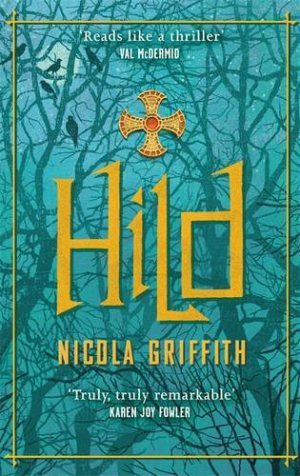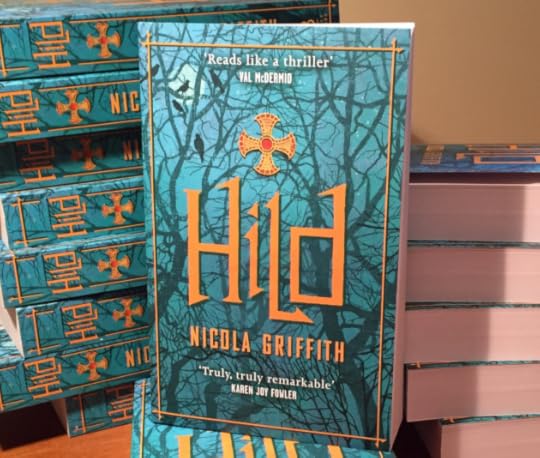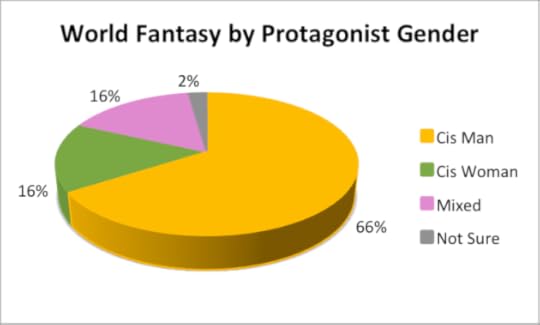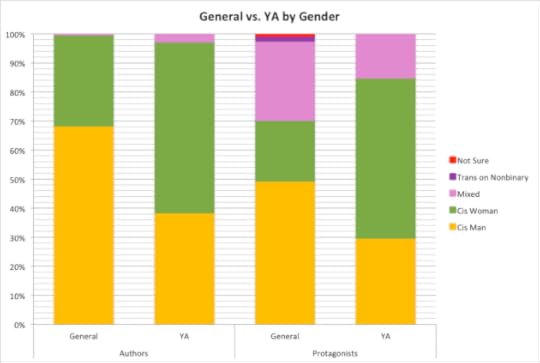Nicola Griffith's Blog, page 69
December 12, 2015
Deadline for signed, personalised books is Tuesday
If you’re planning to order books by me signed and personalised as holiday gifts, now is the time. Deadline: Tuesday, December 14. Earlier is always better, but Tuesday is the finish line.
Having said that, if gift-timing isn’t an issue, I’ll be happy to do this anytime. Phinney Books will ship anywhere in the world. And they’re right next to the pub, a great to have an excuse to pop in for a pint. Not that I need an excuse…








December 9, 2015
Prepping to blow up the tree
Every year I blow up the Christmas tree. We haven’t got our tree yet, so I’m warming up with BB-8 having a go at the dining room table.
If you want to see the kind of thing that might be coming soon, see my YouTube Channel, “Blow Shit Up!”








December 3, 2015
Signed books outside the USA: deadline tomorrow!
If you’re outside the US and want to buy a signed and/or personalised copy of one of my books in time for the holidays, act now. The deadline is tomorrow, Friday 4 December.
Those of you who live here have a wee bit longer: til Tuesday 15 December.
Here’s how to go about ordering from Phinney Books (just next to the pub on Greenwood Ave so it’s really—really!—not a chore).








November 21, 2015
Get signed, personalised books for the holidays
This year I’m teaming up again with Phinney Books, on Greenwood Avenue, Seattle, to bring you signed books for the holidays. Why Phinney Books? Well, because it’s right next door to the pub! Which makes it massively, convivially convenient for me. Also, Phinney Books is my idea of a perfectly-sized bookshop with just the right stock.
Here’s how it works.
Email info@phinneybooks.com (phone is okay: 206 297 2665) with billing info: all major credit cards accepted. They use Square, so they’ll also need the 3-digit code on the back and your billing postal code.
Tell them what you’d like, e.g. Hild (paperback or hardcover or audio CD) or another of my books. (See below.) Or, hey, another book by somebody else—lots of books, any books! It’s the holidays. You (and your friends, your family, everyone you’ve ever met) deserve something nice. Splurge! For example, why not treat someone to all three Aud books? Or the science fiction set: Ammonite, Slow River, and With Her Body ?
Tell them whether you want the books by me personalised (to you, or to someone else; if so, whom; and what short thing you’d like me to add). If you give this order by phone, please spell out even the most common names.
Give them your mailing address and payment info.
Beam, sit back and relax: you’ve done your holiday shopping!
Tom, the owner, tells me domestic shipping by media mail costs about $4 for one book, $5 for the memoir. He is happy to ship multiple copies, to ship internationally, and to ship express/priority, but then there will be extra charges you will have to work out with him. (Shipping to the UK and Australia, for example, runs about $20 to $30 US.)
Deadlines: we think Tuesday 15th December is a safe deadline for books shipping domestically via media mail, but if you’re willing to pay for priority mail, we could probably push that out a bit. International, let’s say Friday 4th December
So basically you have two weeks for International and just over three weeks for Domestic. Go for it! I’ll do my best to sign your books before I go to the pub, which means everything will be spelled right. Mostly…
My books (all paperback unless otherwise noted):
Novels:
Hild (paperback in stock; hardcover in stock; audio CD, special order)
Stay , Aud II (in stock)
The Blue Place , Aud I (in stock)
Slow River (in stock)
Ammonite (in stock)
Always , Aud III (in stock)
Stories:
With Her Body (in stock)
Memoir:
And Now We Are Going to Have a Party (collector’s boxed set; in stock)
Please Note:
The Hild audio CD has to be ordered. Allow some time. Assuming the audio CD comes shrink-wrapped, I’d have to open the wrap to sign, so do please be aware of that.
The memoir is also shrink-wrapped. However, all are already signed (on the back of the photo inside), so you’d get that pristine. Unless you want it personalised, in which case I have to rip off the shrink wrapping to sign the box.








November 2, 2015
A splendid idea: Crowdsourcing Worldcon GoH candidates
This is a splendid idea: a way for readers (and viewers and listeners and gamers and cosplayers) to give their thoughts on who they’d like to see honoured at a Worldcon—the international jamboree that is the annual gathering of f/sf enthusiasts and professionals.
The is excerpted from SFSFC’s website. (Via Cheryl Morgan).
The San José in 2018 Worldcon bid is asking the science fiction & fantasy community’s assistance in ensuring worthy candidates are not overlooked as the bid considers its choices for Guests of Honor for the 76th World Science Fiction Convention.
Worldcon’s Guest of Honor appointments function as a sort of lifetime achievement award for contributors to SF & F literature, arts and the community. SJ in 2018 asks people to send guest recommendations to goh@sjin2018.org, and to include in their recommendation how the candidate meets the basic criteria for consideration and why they think the candidate should be honored.
Recommendations will be accepted through December 15, 2015.
The traditional criteria for Worldcon Guest of Honor consideration are:
An established career, usually considered to be 30 years from entry into the field.
Current relevance, usually considered to be current activity and notability. In the case of writers, availability of their back catalog in print/distribution is an excellent yardstick.
No prior recognition as a Worldcon Guest of Honor (list of past guests)San José in 2018 is considering honoring guests in the following genre fields:
Writing
Editing
Art
Music
Science
Fandom
Andy Trembley, the bid chair, and Kevin Roche, the convention chair, ran Westercon 66, where Kelley and I were co-GoHs in 2013. It was fantastic, a beautiful convention (I wrote about why here). Want to see a science writer or musician of colour honoured? A QUILTBAG writer or artist basking in the limelight? Eager to listen to and talk with a woman editor or podcaster? Here’s your chance. Crowdsourcing is a great way to diversify the pool of potential honorees, so do take the time to email your suggestions to goh@sjin2018.org.
Thank you!








October 26, 2015
Subject, not object: the egg subsumes the sperm
English is a rich language. We can shade our meaning with both lexical and grammatical choices but the powerhouse of any sentence is its verb. Verbs can be weapons or balm, verbs are often directional, and verbs are always revealing. Who does what to whom tells the reader a lot about the characters involved—but also a great deal about the underlying assumptions and/or agenda of the writer. Sadly, unskilled writers can be unaware of their bias.
When I was thirteen (or thereabouts) I sat in a biology class. Yet again we were told, “The sperm penetrates the egg.” Old hat. I was barely listening. But this time I sat up straight and thought, “No, it doesn’t!” It’s not that I disagreed with the essence of the thing, that egg and sperm fused, but that the phrasing the teacher used, the one in all the text books, pissed me off. Suddenly it really pissed me off. Yet again, the boy/sperm got all the exciting action (swimming, penetrating) while the girl/egg had to just sit there like a lump and wait. And I was done with it, done with the idea of Male do, female done to. Done with the whole cultural tale of woman-as-object and man-as-subject.
It’s possible that one of the engines of my writing career was that gush of rage when I realised that verbs not only mirror unconscious power dynamics but reinforce them.
That day in class, of course, I couldn’t articulate my new understanding. Now I can. Now I can manipulate sentences to convey the basics of mammalian reproduction to reflect cultural female-as-object-male-as-subject tropes: “The sperm penetrates the egg”. Factual balance: “Two gametes fuse to create the zygote”). Or an opposite but equally lop-sided power narrative: “The egg subsumes the sperm”. If I mess with word order and passive/active voice I can probably come up with more than a dozen ways to colour the essentials.
It can take the edge off the boredom if, during a routine conversation with an idiot, in my head I turn their sentences inside out and add little stories. Imagine a queen egg on a jousting-tourney style dais watching in amusement as lots of fighty little sperm push and shove each other in a dash across the field. The queen leans down to examine the half a dozen out-of-breath competitors who make it to the finish line. She beckons three promising candidates forward for a closer look. Today, one of them meets her approval. She nods to her guard, points, and the gate to the royal enclosure swings open… Somedays she might find all the competitors unworthy, or too tedious for words, or she’ll be busy with other, more important things. But whatever mood she’s in, my story is always about her. She is subject, not object.








October 21, 2015
More UK reviews
Now we have the Independent on Sunday:
“The world of the Anglo-Saxon poets who wrote ‘The Wanderer’ and ‘The Seafarer’ spring to life here.”
“Nicola Griffith works a special brand of literary magic…a stunning blend of real history and soaring imagination…steeped in the language and customs of early Britain, rich in historical detail, outstanding in observation of human nature… Hild is not just a novel to read and enjoy but the witnessing of a story…believable and breathtaking.”
and the Independent:
“An impressive job of conjuring…bewitching.”
to add to the Guardian:
“The luxuriously long and utterly absorbing Hild is based on a true story […] A magnificent and convincing portrayal of a strange, wild, beautiful world.”
and BBC History magazine:
“Vivid, richly detailed…a powerful, clever novel. Griffith illuminates the so-called Dark Ages, reconstructing an often alien historical world with great precision.”
From the publisher:
‘You are a prophet and seer with the brightest mind in an age. Your blood is that of the man who should have been king …That’s what the king and his lords see. And they will kill you, one day’
Britain in the seventh century – and the world is changing. Small kingdoms are merging, frequently and violently. Edwin, King of Northumbria, plots his rise to overking of all the Angles. Ruthless and unforgiving, he is prepared to use every tool at his disposal: blood, bribery, belief. Into this brutal, vibrant court steps Hild – Edwin’s youngest niece.
With her glittering mind and powerful curiosity, Hild has a unique way of reading the world. By studying nature, observing human behavior and matching cause with effect, she has developed the ability to make startlingly accurate predictions. It is a gift that can seem uncanny, even supernatural, to those around her.
It is also a valuable weapon. Hild is indispensable to Edwin – unless she should ever lead him astray. The stakes are life and death: for Hild, for her family, for her loved ones, and for the increasing numbers who seek the protection of the strange girl who can see the future and lead men like a warrior.
In this vivid, utterly compelling novel, Nicola Griffith has brought the Early Middle Ages to life in an extraordinary act of alchemy. Drawn from the story of St Hilda of Whitby – one of the most fascinating and pivotal figures of the age – Hild transports the reader into a mesmerising, unforgettable world.








October 5, 2015
UK reviews of Hild
From the Guardian:
The luxuriously long and utterly absorbing Hild is based on a true story […] A magnificent and convincing portrayal of a strange, wild, beautiful world.
From BBC History magazine:
“Vivid, richly detailed…a powerful, clever novel. Griffith illuminates the so-called Dark Ages, reconstructing an often alien historical world with great precision.”
From the publisher:
‘You are a prophet and seer with the brightest mind in an age. Your blood is that of the man who should have been king …That’s what the king and his lords see. And they will kill you, one day’
Britain in the seventh century – and the world is changing. Small kingdoms are merging, frequently and violently. Edwin, King of Northumbria, plots his rise to overking of all the Angles. Ruthless and unforgiving, he is prepared to use every tool at his disposal: blood, bribery, belief. Into this brutal, vibrant court steps Hild – Edwin’s youngest niece.
With her glittering mind and powerful curiosity, Hild has a unique way of reading the world. By studying nature, observing human behavior and matching cause with effect, she has developed the ability to make startlingly accurate predictions. It is a gift that can seem uncanny, even supernatural, to those around her.
It is also a valuable weapon. Hild is indispensable to Edwin – unless she should ever lead him astray. The stakes are life and death: for Hild, for her family, for her loved ones, and for the increasing numbers who seek the protection of the strange girl who can see the future and lead men like a warrior.
In this vivid, utterly compelling novel, Nicola Griffith has brought the Early Middle Ages to life in an extraordinary act of alchemy. Drawn from the story of St Hilda of Whitby – one of the most fascinating and pivotal figures of the age – Hild transports the reader into a mesmerising, unforgettable world.








September 30, 2015
The best birthday present you could give me
Today is my birthday. Tomorrow Hild is out in paperback in the UK. The best present you could give me? Go buy it!
It’s newly and lusciously typeset. At 640 pages, it’s more capacious and beautiful than ever before. I’ve put together a good list of UK independent bookshops so you can get it there. Or you could use your favourite chain or online retailer:
Waterstones | Amazon | Foyles | Blackwell’s
Also available in Australia and New Zealand:
Booktopia | Bookworld | Paper Plus | Mighty Ape | Amazon | iTunes
Still not sure? Go read the first chapter or watch me read the beginning.
Praise
“Vivid, richly detailed…a powerful, clever novel. Griffith illuminates the so-called Dark Ages, reconstructing an often alien historical world with great precision.” — BBC History Magazine
“Beautiful, thorny jacket for this beautiful literary novel. It genuinely brings the period to life.” — The Bookseller
“You could describe Hild as being like Game of Thrones without the dragons, but this is so much deeper than that, so much richer. A glorious, intensely passionate walk through an entirely real landscape, Hild leads us into the dark ages and makes them light, and tense, and edgy and deeply moving.” — Manda Scott
“In it’s ambition and intelligence, Hild might best be compared to Hilary Mantel’s novels about Thomas Cromwell.” — Bookforum
“Hild is a book as loving as it is fierce, brilliant and accomplished. To read it felt like a privilege and a gift.” — NPR
“…dazzling… Griffith’s lyrical prose emphasizes the savagery of the political landscape, in which religion, sex, and superstition are wielded mercilessly for personal gain.” — Paris Review Daily
“The novel resonates to many of the same chords as Beowulf, the legends of King Arthur, Lord of the Rings, and Game of Thrones—to the extent that Hild begins to feel like the classic on which those books are based.” — Neal Stephenson
“Griffith’s narrative flows like a river; Hild’s thoughts and deeds are expressed in pitch-perfect tone, in prose approaching poetry.” — Historical Novel Society
“The best fictional attempt to recreate Dark Age Britain that I have ever read.” — Alex Woolf








September 29, 2015
Science fiction prize data from 1953 to the present
Today over at Lady Business: a data-heavy look at the gender of award-winning f/sf writers and their protagonists. It’s an important post, stuffed with numbers and charts on 19 different fantasy and science-fiction awards. Their data—and there’s a huge amount—support the conclusion I’ve reached before: books about women tend not to win prestigious literary awards.
ETA: Here’s Lady Business’s money paragraph:
This project demonstrates that SFF books by or about cis women are less likely to win awards than books by or about cis men. Trans and nonbinary authors do not win awards at all, and trans or nonbinary protagonists are extremely rare. Overall, there were more award-winning books written by cis men about cis men than there were books by women about anybody. While there have been recent gains in terms of diversity in awarded books, this is likely part of a cycle of gains and pushback that has repeated itself throughout the history of SFF awards. SFF awards have a problem when it comes to gender: they privilege cis men and the cis male experience over that of cis women and trans and nonbinary individuals.
Lady Business has kindly given me permission to use some of their data plus a handful of charts. The analysis below is mine—I’ve not yet evaluated their whole post; we may differ on a few minor points—but the data and charts are mostly theirs, so please make sure they get due credit.
Lady Business counted a total of 751 individual f/sf prizes awarded for book-length fiction aimed at both Adult and Young Adult readers1. The older, more established awards show predictably lopsided results: overwhelming bias against women both as writers and protagonists.
For example, in its 40-year history, the World Fantasy Award, probably the most prestigious award for fantasy fiction, has awarded only 16% of its prizes to books about women—and 66% to books about men.2
World Fantasy Award-winning women wrote about men as often as they wrote about women—while men wrote about men 11 times as often as about women.
The World Fantasy Award is juried3, that is, voting membership is tightly restricted. What happens when prizes are awarded by popular vote, and those votes are not restricted by paid membership? Take a look at the Goodreads awards.4
This mirrors my data on the Costa Best Novel award and the IMPAC Dublin award. That is, the popular and less-prestigious awards are much more likely to go to books about women than are career-changing, juried awards. It’s hard to escape the conclusion that it’s only okay for women to win an award when that award isn’t well-enough regarded to trumpet in publicity material, trigger a run up the bestseller lists, or require additional print runs.5
Lady Business’s comparison of Adult and Young Adult awards is particularly interesting. As I found out in my original post, stories about girls are fine and worthy as award-winners, but once girls grow up to be women, we no longer count; we seem to become unimportant and/or uninteresting, unworthy of prizes.
Here’s one graph most definitely deserving of deeper exploration: the change in award-winning protagonists’ gender, over time.6
On first glance, it looks as though things are getting better. Almost hopeful. But before I feel sure of that I’d like to split out the data to compare each award to itself over time: the Hugos over time, the World Fantasy over time, the Ditmars over time. That way I’d be confident that individual awards were changing, rather than the change being due to the admixture of data, the addition of more popular/less-restricted awards in recent times, and the loosening of some restrictions on other awards, such as the Locus. I haven’t yet had time, though, to see if the data on the Lady Business spreadsheets would support that kind of slicing and dicing.
My own Hugo data, which covers the last 15 years, might be make a useful comparison to Ladybusiness’s 63 years-worth of same.
data combined from my recent count and Lady Business
Judging by the comparison, the improvement over time is marginal: in the last 15 years, women writing about women have won 13.3% of the awards whereas over the last 63 years they won 8%: an overall increase of only 5%.7 Five percent. In half a century. That’s not much. Change might be coming, but it’s coming slowly.
How do we accelerate this change?
To paraphrase Maya Angelou: to do better, we have to know better.8 And that won’t happen overnight. We have to gather data to find the inflection points of the operation of bias. It’s only once those are clear that we can sensibly experiment by applying pressure at specific points and seeing what happens. Meanwhile? Take the Russ Pledge. And go read the post at Lady Business; tell them how much you appreciate their work. Spread the word.
1 For some of these awards, such as the Hugo, there are several decades of data from a single category; other, such as the Goodreads, have only been in existence a handful of years but are followed in several categories.
2 Fantasy has often been considered to be more open to women than sf. These results fly in the face of that supposition.
3 The jury votes on a shortlist selected (mostly) by another restricted group: those who can afford membership in the annual World Fantasy Convention. The jury itself is selected by the World Fantasy Awards Administration. They Who selects WFAA? Good question. But there’s an interesting look at the age of WFA winners on Tor.com which might offer some clues.
4 Admittedly, we’re not comparing apples to apples here. I think Ladybusiness combined several categories for the Goodreads data, while WFA looks only at one.
5 I’m getting more and more curious about the gender mix of those who vote on these things. Prizes such as the Man Booker, for example, are relatively well-balanced when it comes to the jury—though I don’t know about the composition of those who select those juries, or those who chair them, which (if I had to guess, which I do, because I don’t have data) skew heavily male.
6 I am heartened by the appearance and increase of non-binary and/or trans protagonists. I’m not sure Ladybusiness and I count and categorise the same way, though. My approach so far has been that if an author or protagonist identifies as a woman or man I’ll count them as such. So far it hasn’t come up in the awards I’ve looked at but I’m eager for input on this.
7 And men writing entirely about men still win the lion’s share: 43.8% in the last 16 years vs. 48% over the last 63. The decrease in stories about men more or less matches the increase in stories about women: a little less and a little more than 5% respectively. Interestingly, fewer men (that is, none in the last 16 years as opposed to 6.3% over the award’s history) win for writing wholly about women. What does this mean? I don’t know. I’d love to hear your ideas.
8 “I did then what I knew how to do. Now that I know better, I do better.”


















